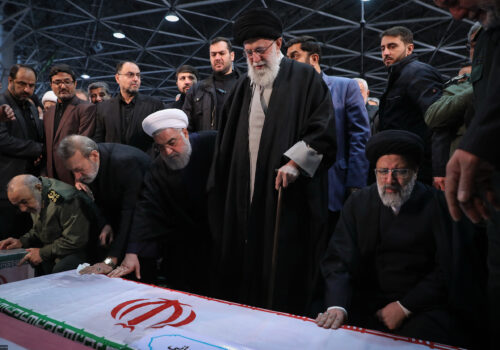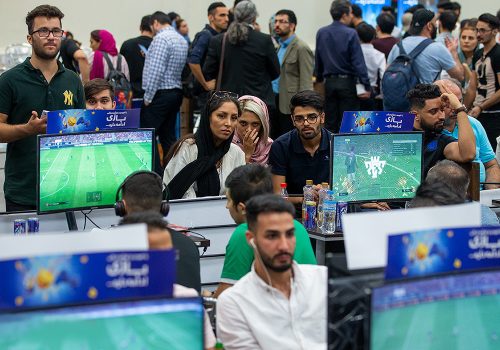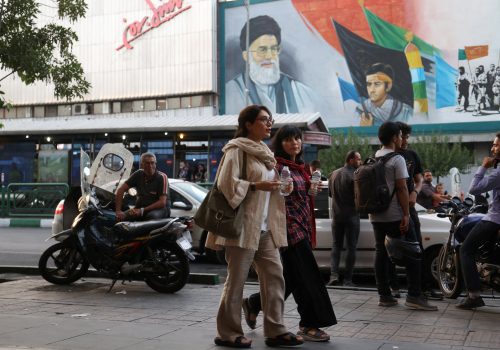Tehran cooked up a conspiracy theory blaming Israel for US TikTok ban
“We really have a TikTok problem, a Gen Z problem,” Anti-Defamation League (ADL) director Jonathan Greenblatt said in a recording. He notes that Israel is facing a “major generational problem” in the United States and that “the numbers of young people who think that Hamas’, you know, massacre was justified is shockingly and terrifyingly high.”
After the US House of Representatives overwhelmingly passed a bill on March 13 that could lead to a nationwide ban against the Chinese social media platform TikTok, old conspiracy theories sprouted back to life, with one using Greenblatt’s comments to explicitly pin the blame for the possible ban on Israel. Not surprisingly, the Islamic Republic reveled in the story involving its archenemies, the United States and Israel, along with its strategic ally, China.
It appears that the primary source of the recording is an article titled “American Youth Break Free from Zionist Yokes,” posted in November 2023 by the Tehran Times, an English daily published in Tehran by Mehr News Agency, an arm of the Islamic Propagation Organization (IPO), whose director is directly appointed by Supreme Leader Ayatollah Ali Khamenei. The organization is a key element of the Islamic Republic’s foreign-facing propaganda machine.
On March 20, the ADL issued a statement confirming the authenticity of the recording. The statement adds that the comments were made “during a public Zoom call.” The ADL and Greenblatt himself have previously called on social media platforms to introduce more robust mechanisms for countering hate and harassment. The recent statement from the organization concludes, “These calls-to-action have not included an outright ban of the platform.”
After the recording went viral in March, Tehran Times editor in chief Mohammad Sarfi boasted on X (formerly Twitter) that it was released “exclusively by Tehran Times” in November 2023, arguing that it shows that his daily is “ahead of world developments.”
SIGN UP FOR THIS WEEK IN THE MIDEAST NEWSLETTER
The conspiracy theory blaming Israel for the proposed TikTok ban has been repeated by the state media in Iran. Hassan Abedini, the top presenter of the state broadcaster, the Islamic Republic of Iran Broadcasting (IRIB), also alleged that the ADL was behind the TikTok ban and wrote on X, “Zionists control freedom of speech in the West.”
Iran’s Young Journalists Club News Agency, run by the state broadcaster, called the possible ban an “assault on freedom of speech.” Ultraconservative Raja News called the 2023 TikTok hearing an “outright inquisition.” Still, it continued using the possible TikTok ban to justify online censorship in Iran, arguing that access to “cyberspace is a security matter.”
China and Iran, bastions of free speech
With the possible US TikTok ban generating buzz around the globe, the United States’ free-speech credentials have come under fire from states infamous for their oppression of domestic free speech, Iran and China.
The Chinese Foreign Ministry has released a 3,600-word statement that “expose[s] what ‘free speech’ is according to the United States” and concludes by accusing the US of “[relying] on lies to weave ‘the emperor’s new clothes,’ and how it smears others to maintain its hegemony.”
Unsurprisingly, the statement fails to mention that Beijing has imposed draconian restrictions on the country’s 900 million internet users, pervasive state surveillance, and other abhorrent human rights violations, from suppressing freedom of speech and assembly to committing genocide against the Muslim-majority Uyghur ethnic group.
The statement also doesn’t mention China’s record on upholding freedom of expression at home. Through the Golden Shield Project—launched in 1998 and often called the “great firewall of China”—the regime’s Ministry of Public Security has restricted what content people can access in the country. The regime currently blocks almost all major online platforms, including Google, YouTube, X, Instagram, WhatsApp, and Facebook.
The Tehran Times has also been very concerned about “violations” of free speech in the United States. It has celebrated the “myth of online freedom in [the] US” fading and has accused the United States of waging “social media warfare” and a “propaganda war” against the Islamic Republic.
However, the same outlet has vehemently justified Iran’s weeks-long state-imposed internet shutdown in 2019, which came in response to nationwide protests that were used as cover for security forces to kill 1,500 protesters. It has argued that the government was left with no option but to fully cut people in Iran off from the world to prevent “misuse of the Internet by the outside agencies who [sought] instability in the country” and were “engineering a crisis in Iran.”
The paper’s parent agency, Mehr News, has also actively defended online censorship in Iran, arguing that “online spaces are controlled in developed countries,” has cheered on security forces for cracking down on “networks promoting corruption” (referring to content on modeling or modern lifestyles), and also justified the too-common mass arrest of citizens for defying sharia laws and exercising their basic rights.
The news agency has also been on the frontline of promoting propaganda from the Islamic Revolutionary Guard Corps (IRGC), calling social media the “primary venue of infiltration by the enemies,” presumably the United States and its allies. Furthermore, Mehr has celebrated the Islamic Republic’s troll farms and social media influence campaigns operating in conjunction with IRGC digital operations and hacking campaigns by the likes of Charming Kitten and the IRGC’s Cyber Army.
Iron veil and enlightenment jihad
While the Islamic Republic’s propaganda machine criticizes the United States for its “violations” of free speech online, the clerical establishment has shown time and again that the Internet has no place in Khamenei’s vision for the country. The regime’s response to the age of information has been an iron veil.
The eighty-four-year-old ayatollah has repeatedly described social media as a “weapon” and consistently voiced opposition to Iranians having “unbridled” access to the Internet. Over the years, his regime has also repeatedly used internet shutdowns to quell protests. Currently, all major social media platforms are banned in Iran, including YouTube, X, Instagram, WhatsApp, Facebook, Telegram, and TikTok.
Freedom of press and freedom of expression receive similar treatment, as the regime is one of the world’s leading jailers of journalists. During the 2022 Woman, Life, Freedom uprising, the regime arrested at least eighty journalists and twenty-two thousand protesters.
The clerical establishment’s war on freedom of speech has intensified since February 2022, months before the nationwide protests that shook the foundations of the Islamic Republic. At that time, Khamenei declared “enlightenment jihad” against the “enemy”—presumably the United States and its allies. He argued that the adversaries are waging “hybrid warfare” against “Islam and the Islamic Republic,” deploying their “media empire” and social media in an “onslaught to distort and destroy” the clerical establishment in Iran. He argued that the Islamic Republic must take the war to the “enemy” through “enlightenment jihad.” Heeding Khamenei’s direct order, the regime has flooded the internet with bots, trolls, and sock puppets, targeting dissenting voices and taking its colorful influence campaigns at home and abroad to another level.
Interestingly, TikTok has been one of the platforms of choice for the Iranian clerical establishment to export its poison. An account named jahadtabiin2 (“enlightenment jihad” in Persian) with twenty-one thousand followers posts tacky videos promoting the Islamic Republic’s ideology, speeches by the supreme leader, and propaganda against Iranian dissidents. The regime has also recruited TikTokers glorifying the clerical establishment and its top men, including IRGC Quds Force Commander Qasem Soleimani, who was killed four years earlier via a US drone strike in Iraq.
While it imposes an iron veil separating people in Iran from the rest of the world, the regime is quick to cry wolf when its top officials face the slightest setback on social media for violating platform guidelines.
In February, Meta banned Khamenei from Instagram and Facebook over his repeated violations of Meta’s “dangerous organizations and individuals policy,” which includes promoting organizations backlisted by the United States, including the terrorist group Hamas.
In response, Abbas-Ali Kadkhodaei, a member of the powerful Guardian Council, which is controlled by the supreme leader and has veto power over the parliament, wrote on X that the move “reveals [the] true face of so-called advocates of freedom of expression,” a right that, according to him, “has been taken hostage by [the] West.”
Ironically, all three leading social media platforms—Facebook, Instagram, and X—are banned in Iran for everyone except regime supporters and officials, who have been given access to an uncensored Internet.
Khamenei maintains an active presence on X, sharing Holocaust denial to his one million followers on the platform and calling for a “final solution” against Israel.
Ayatollah’s TikTok solution
Iran bans the use of all internationally popular social media platforms. However, the ban against TikTok was presumably enforced with help from the Chinese-owned service, at least until September 2023.
Unlike other social media platforms, people in Iran could not access TikTok even using censorship-circumvention tools (like virtual private networks) as long as they had an Iranian SIM card in their phones. This restriction has apparently been removed.
This implies that TikTok actively identified Iranian SIM cards and banned users. Both the restriction and its apparent end do not bode well for people’s rights to freedom of speech and privacy in sight of the Islamic Republic’s preexisting collaboration with China in fields of surveillance and censorship, which is opaquely listed as part of the twenty-five-year Iran-China deal signed in 2021.
However, people in Iran, especially Generation Z, are tech savvy and resourceful when circumventing restrictions. That is why there have always been TikTokers inside the country. To use the service, some removed their SIM cards before opening the app or had a second device (a smartphone or tablet) without a SIM. They then masked their Internet Protocol (IP) address and location with circumvention tools to get on TikTok.
The second group used unofficial TikTok “forks,” modified versions of the original app released by unknown programmers. The TikTok forks used in Iran are suspiciously named TikToker_IR, a naming style popular with state-affiliated tech companies. In the past, Iranian security forces have developed and published forks of popular banned applications like Telegram, embedding surveillance capabilities in the apps and breaching users’ privacy.
However, in September 2023, TikTokers in Iran observed a change in the enforcement of the ban. Since then, users have been able to access the app without removing their SIM, and only need to use a VPN. This can also be part of the regime’s recent shift to introducing more alternatives to “Western” social media platforms by either curbing limits on apps owned by Tehran’s allies or—as was proposed by the powerful Supreme Council of Cyberspace, controlled by Khamenei—introducing forks for popular banned apps like Instagram with embedded surveillance and censorship capabilities.
From behind the digital iron veil in Iran and the great firewall of China, the two regimes have joined forces, weaving a web of propaganda and conspiracy theories to fight against TikTok regulation in the United States. But for now, with other Western powers such as Canada and the United Kingdom possibly following suit, the fate of the app is in balance around the globe.
Khosro Sayeh Isfahani is an advocate, journalist, and Internet researcher with years of experience working in Iran, including work related to the LGBTQI community.
Further reading
Wed, Mar 13, 2024
For meaningful change in Iran, Khamenei has got to go
IranSource By
The supreme leader's death will provide people inside Iran and the diaspora with a historic chance to make a foray into fundamental change in the country.
Tue, Jul 7, 2020
An Iranian gamer’s battle against sanctions and sexism
IranSource By
According to a 2017 study from Iran Computer and Video Games Foundation, there are twenty-eight million Iranian gamers.
Tue, Aug 15, 2023
Women in Iran fight to break Islamic Republic ‘cage’
IranSource By Khosro Sayeh Isfahani
“I will not return to that cage. I will not bow before bondage.”
Image: An Iranian man holding his smartphone looks on while standing under an anti-Social networking banner in Tehran Grand Bazaar (Market), December 3, 2022. (Photo by Morteza Nikoubazl/NurPhoto)


